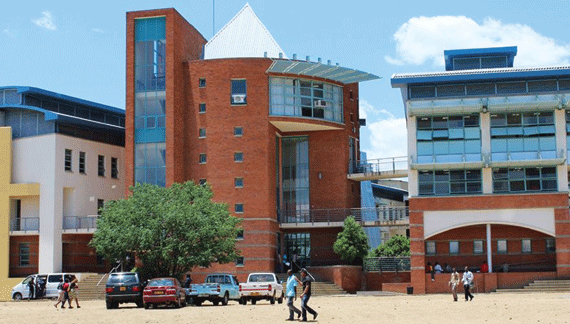
THE National University of Science and Technology (Nust) registered a slight decrease in enrolment for the 2013 to 2014 academic year due to space limitations and failure by students to pay fees, according to the institution’s annual report.
NQOBILE BHEBHE CHIEF REPORTER
The report says the harsh economic environment adversely affected the operations of the university.
Nust vice-chancellor Lindela Ndlovu yesterday released the annual 2013 mandatory report outlining the university’s activities.
According to the report, the university registered a 23,8% decrease for undergraduate programmes.
“The section received and processed a total of 4 348 applicants for admission into the first year of undergraduate programmes for the 2013 to 2014 academic year,” the report reads.
“From those applications, the university programmes admitted 1 328 candidates compared to 1 742 who had been admitted in 2012 who met the requested criteria.
“The decrease of 414 (23,8%) in the number of admitted students was due to inadequate space and resources which could not allow for an increase in the number of first-year students as there were already more second-year students in 2013 than they were in 2012.”
- Chamisa under fire over US$120K donation
- Mavhunga puts DeMbare into Chibuku quarterfinals
- Pension funds bet on Cabora Bassa oilfields
- Councils defy govt fire tender directive
Keep Reading
According to the report, a total of 5 705 students were enrolled in six faculties of which 3 426 were males and 2 279 females.
The report indicated that 1 390 applications for post graduate programmes were received compared to 1 349 in 2012.
“A total of 768 of the 1 390 who applied for admission into various postgraduate programmes were admitted,” adds the report.
“The total undergraduate enrolments decreased by 1,3% in 2013 from 5 781 in 2012 mainly because of attrition attributed to failure of payment of fees by students and a lesser extent other reasons.”
Financially, the report states that notational economic recession resulted “in serious constrains in the government’s ability to follow through on Blue Book budgetary allocations”.
Under salaries grant budget of $24 749 400, only $24 163 393 was received and under recurrent grant, only $50 000 was received out of a budget of $600 000.
Of the $3 350 000 budget under cadetship funding, only $250 000 came through.
Recently, the institution revealed that it was owed $3,7 million by the government in unpaid fees for students on the cadetship programme.
The government’s cadetship programme caters for students from less privileged families who cannot afford to pay fees on their own.










